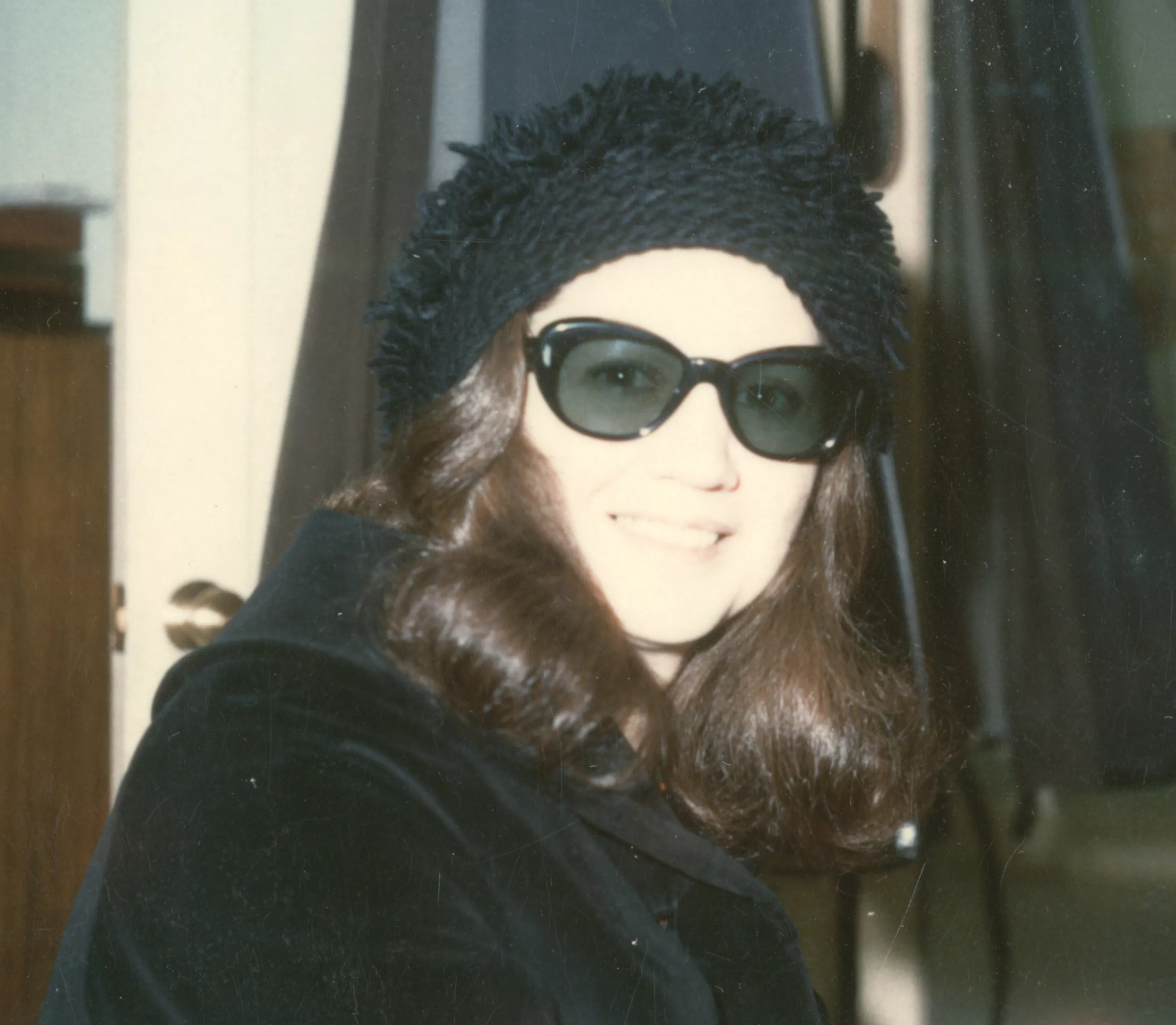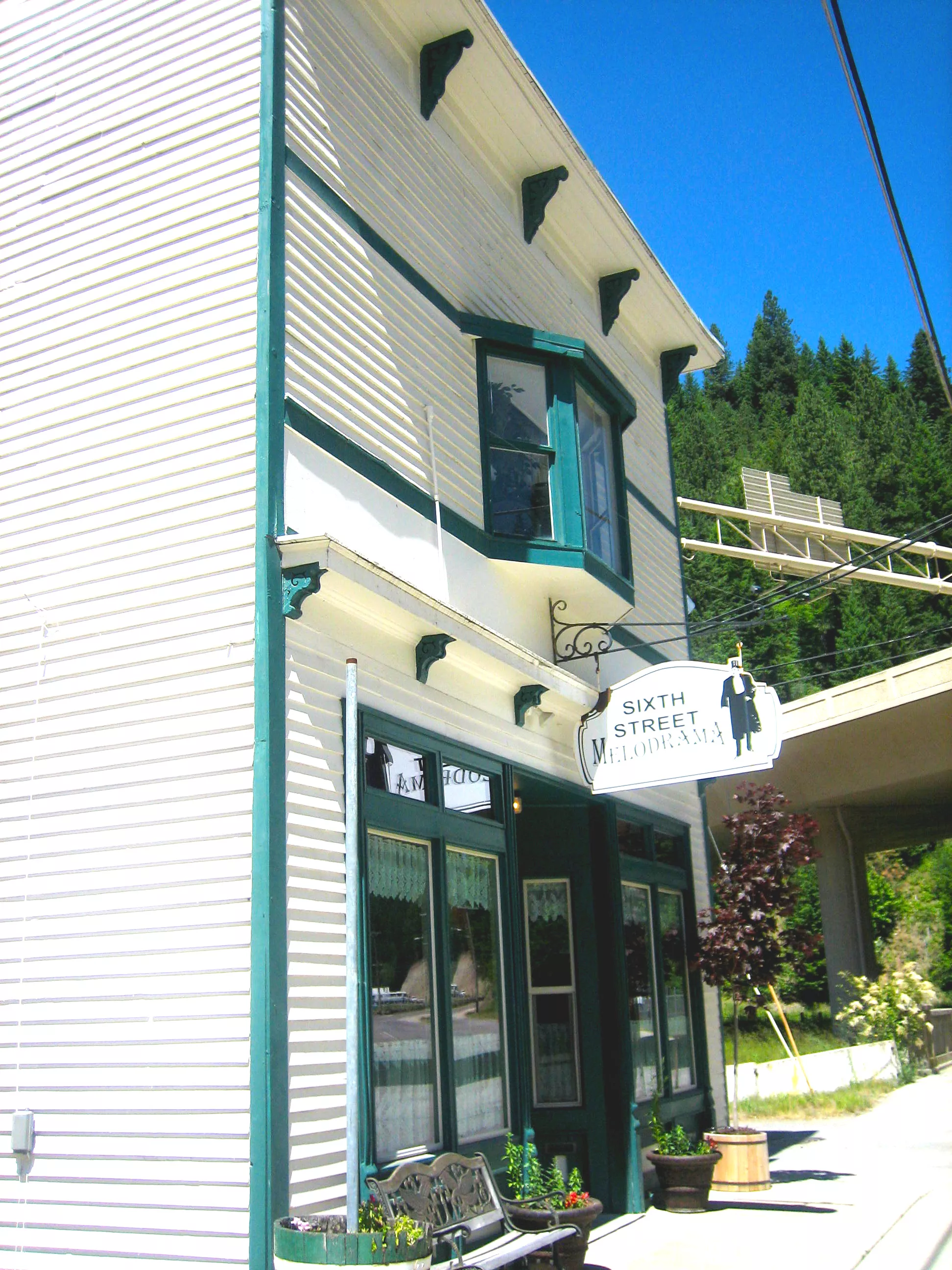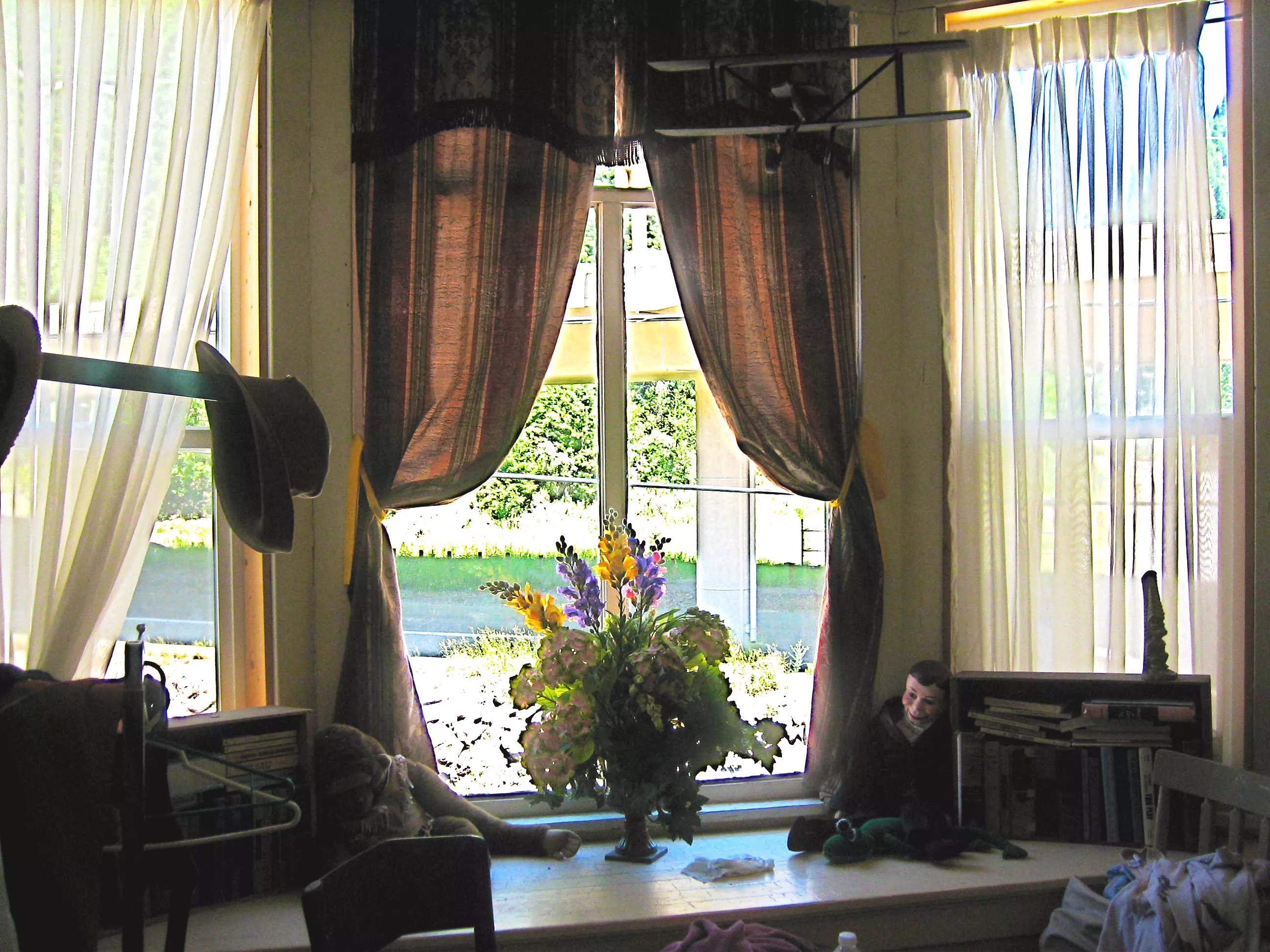It’s been about a week and a half since I read from my work at the Wallace Brewing Company’s Orehouse Tasting Room. It was a packed house: the News Press claimed there were “more than fifty” attendees, but during the question/answer period afterward I counted sixty-four people in the standing room only audience. I was grateful for the opportunity to share some of my in-progress writing in person.
So this post is for those who missed out for one reason or another. Below is a transcript of what I read. For a blog bonus, I’ve added pictures.
Thank you to Chase and Cathleen for hosting this event and inviting me to participate. Thank you to the Wallace District Mining Museum, who funded much of my research.
***
I wish I could have met Dolores. That wasn’t her given name, of course. She was born Mary Giacolone and she died Maria Greer. But for most of her life, she was Dolores Arnold, savvy businesswoman who ascended from working girl to madam of a successful brothel franchise in Wallace, Idaho from 1943 until the late 1980s. Dolores’s story, like her identity’an invented persona she assumed for forty years’is a mix of fact and fiction that became its own reality. Dolores knew that stories repeated often enough could blur together and create a believable myth. She harnessed that power to create a world here, a world where the sex industry could be relatively safe and widely supported by the vast majority of the community, despite its illegal nature.
I’ve conducted more than seventy-five interviews during the course of my research and almost every single person I talk to repeats the following phrases: ‘The houses offered relief for single miners and kept local women from getting raped. The women were clean and didn’t solicit around town or on the streets.’ But especially: ‘The houses were good for the local economy; they gave so much back to the community.’ It’s no accident that these phrases are the univocal chorus around town to this day. They are the result of Dolores’s forty-year reign as queen. One woman I interviewed characterized the brothels as ‘The United Way of Wallace,’ adding that she thought there should be a statue of Dolores in this town (Stewart).
Dolores had striking beauty, even well into old age. ‘People were in awe of her,’ one man told me, ‘she could have been a movie star earlier in her career’ (Higgins). I think people responded to her unguarded, empathic demeanor and the confident way she carried herself, all of which she expressed through her eyes. Taller than the average woman, Dolores had long dark hair and a wide smile. She sensed the motivations of others and noticed details overlooked by most people. Those who knew her describe her as charming, warm, funny, graceful, and elegant. She made everyone feel special. She also had a reputation for strict professionalism in all of her business dealings, prompting a higher standard of excellence among subordinates, colleagues, clients, and community members.

If I could talk to Dolores today, I would ask her what her childhood was like, what drew her to Wallace and what influenced her decision to exchange sex for money. I would ask her what she learned along the way. I would also ask her if she ever had mixed feelings about owning and managing an illicit business commonly perceived as immoral and exploitive, despite its widespread acceptance in Wallace.
Like many women drawn into the sex industry during the 1940s, Dolores suffered a traumatic childhood. Her parents were Italian immigrants who met in New Jersey. Dolores’s father worked in a glass factory there at the time of her birth, and in the early 1920s they moved to Spanaway, Washington, where they bought a farm worth $2,600 in 1930 (1920-1930 US Census data). Dolores’s mother died when she was just six, leaving her widowed husband to raise Dolores and her three siblings, including younger sister Janet and two younger brothers. Before Janet died, she met with Dick Caron to talk about her childhood. During this conversation, Janet said Dolores and her siblings were left to raise themselves after their mother’s premature death, and they often dealt with ‘adverse conditions’ as a result. They found out later that their mother had relatives they never met. Janet assumed they stayed away because they didn’t want to feel obligated to take in the kids. They ‘were better off for being alone,’ Janet claimed, ‘made us tough.’ It did not, however, make them close. While Janet did not interfere with her sister’s life, she also didn’t support it (Caron notes).
Just a year and a half after Dolores’s mother died, the stock market crashed, and the country plunged into the Great Depression. Dolores did not finish high school and moved to Wallace in 1943 at the age of twenty-three, after working in the shipyards at Bremerton, Washington, where she was a “Rosie the Riveter” (Caron notes, Barnard Stockbridge Collection, Mogenson, Morrison, and Truean). She’d heard that Wallace was the place to go if she wanted to take advantage of a particular arrangement here that could be lucrative if approached in the right way.
According to Gary Morrison, a Wallace boy who befriended Dolores in the 1960s when he delivered groceries to the Lux Rooms and considered her ‘like a family member,’ Dolores’s move ‘was a business decision.’ Morrison said she explained it this way:
I made up my mind that I could do that. Once I agreed that I could do that and just set that part of me aside, and said, okay this is business, I’m not going to whine about it, I’m not going to beat myself up about it. That’s what I’m going to do. Once I’d decided that I could accept that, I got in the car and I drove to Wallace. Somebody had told me about Wallace, having these’I had to hunt around and ask people, I didn’t know where the houses were.
She began working on the floor at the Lux Rooms, above where the Sixth Street Melodrama is now.

Timing contributed to Dolores’s successful career: she arrived at an opportune moment for the sex industry, after the introduction of penicillin, which cured most sexually transmitted infections, and before the eruption of AIDS (Roizen). During this era, the brothels were open 24 hours a day, doing ‘booming business’ serving military men (Mayfield, Gordon). Even though Wallace was officially off-limits, sailors and airmen frequently visited. They came from Farragut Naval Base near Coeur d’Alene, Idaho and Fairchild Air Force Base near Spokane, Washington. To get around the off-limits designation, military men would buy a bus ticket for Missoula, Montana, and get off in Wallace to visit the houses without leaving a paper trail that would get them in trouble (Filer). They were not allowed to wear anything but their issued uniforms and madams wouldn’t let them upstairs unless they were in street clothes, but they found a way around this obstacle as well. A cleaning business accessible from the alley behind Cedar Street was known to rent civilian clothes to enable them to visit the brothels while maintaining the appearance of propriety (Filer).
It’s unclear how long Dolores worked before she was able to buy the Lux Rooms because there are multiple conflicting stories about how she came into the means. One man told me she tried to get a loan from the bank but was turned down (‘AH’). There are rumors asserting that she received the money from Hank Day, the prominent mining executive she had a relationship with (Higgins). Another man said Dolores told him she ‘saved every bloody dime. And put it in the bank’ (Morrison). Others guessed she invested in mine stocks (Posnick, ‘JA’). The written record shows that she and Lonnie Greer bought the Lux Rooms from Mary Albertini in 1953 for $7,000 dollars [clarification here: they bought the *building* from her, not the business…].

Dolores built her business into a classy operation, which she expanded in 1968, when she bought the Jade from her friend Loma Delmonte and turned it into the Luxette. Dolores worked hard to create the image of community caretaker and was almost universally admired around town. The walls of her personal room at the Lux, where she entertained especially privileged guests, were adorned with 18 karat gold fleck paint imported from Italy for the price of $200 a gallon and her closet was full of fur coats (‘Tommy’). Dolores began the practice of advertising by giving away Playboy-style pinup girl calendars personalized with her business name and other houses followed her lead by passing out similarly styled matchbooks. ‘In today’s era,’ one local businessman told me, ‘she would easily be a top executive in a large corporation. She was that good. She was instrumental in forming a consortium with the other madams to buy the community stuff’ (Higgins). Dolores worked to promote prostitution as a profession as legitimate as anyone else’s (Hulsizer, Houchin, Michael).

Dolores was friendly and outgoing yet known for her discretion, which was partly what kept her in the good graces of the community. She hosted private parties for local civic organizations like the Gyros. Despite one exception that several people noted, there was no sex at these parties, which operated in accordance with the ‘underlying and rarely spoken agreement’ that they ‘wouldn’t fall into some kind of a debauchery, you know, a big orgy that then would be talked about in the community for the next century,’ as one man put it (Morrison). Dolores is also in a regional newspaper saying, ‘People always think the worst of these places. But we do it right’ (Henderson). ‘Doing it right’ probably contained some sexual innuendo, but she was also referring to background checks and doctor’s visits. When the women first arrived to work at the houses, police officers took their mug shot and fingerprints, sent copies to the FBI and Immigration, and received a rap sheet back. The officers would then call the brothel managers with the information to ensure they weren’t employing underage girls or anyone who appeared to have connections with organized crime (Jacobson). ‘Doing it right’ also referred to discretion: the working girls ‘would never come up to a guy around town and say that she knew him,’ one woman told me, adding, ‘they kept their personal life personal and their business life professional’ (Schonhanes).
Most of the people I’ve interviewed make sure to mention how the madams tipped generously for deliveries and bought most of the raffle tickets for various fundraisers. Although there’s no doubt that Dolores was generous, she was also very aware of public relations, and she purposefully appealed to the classic ‘heart of gold’ stereotype. She was the biggest contributor around town, renowned for winning all the raffles and then turning the prizes into donations, passing along her Demolay turkeys to families in need (Morrison). Dolores notoriously bought the school’s band uniforms, in part, rumor has it, in exchange for an agreement that they would no longer march around the streets to practice early in the morning.

The madams and women who worked in the houses emphasized the positive. Men and women alike repeat that the houses were symbiotic with the town, which operated according to a ‘live and let live’ system of morality. The madams circulated sayings that explicitly connected their work to family and community values. For example, ‘Dolores often said that she saved more marriages than any clergyman ever did.’ (Higgins). The madams donated money in visible ways to local government, schools, charities, and churches. They knew that word of their works would travel if they maintained a consistent image.
And word did spread. A New York Times article discussing the temporary closure of the houses in 1973 notes how Dolores gave baskets of food to the families of the [ninety-one] miners who died in the Sunshine Mine disaster the previous year (‘5 Brothels Shut’). Another newspaper story claims that ‘Dolores Arnold and her contributions to the town of Wallace are legend, and most of the legend is true,’ although one ‘rumor’that she has solid-gold bathroom fixtures in her apartment at the Lux and Luxette Hotel’needed clarification. Gold plate, Dolores explained, not solid gold’ (Henderson). This article, written during the 1980s, also corrects a popular legend about her Cadillac that nevertheless continues to be repeated: ‘The house madam seemed amused by another story that she orders a new Cadillac in Spokane every year and pays for it in cash. ‘˜That’s a lie… My Cadillac is 14 years old” (Henderson). One story often told locally involves a robbery or fight at one of the houses, resulting in a court case. Dolores was called as a witness, and at one point, the lawyer asked her which way the door in the brothel opened. She said to him, straight-faced, ‘you know damn well which way that door opens’ (‘FG,’ Higgins, Achord). According to another version of this story, it wasn’t Dolores but a girl who worked for her, and she was fired because of her lack of discretion (Magnuson).

One of the more popular services was said to be the bubble bath (‘Betty,’ Mooney, ‘Paul’), even though it was also one of the most expensive. Terry Douglas, who maintained the ‘coin operated amusement devices’ in the house’s bars and jukeboxes, related a story about his boss giving him money for a bubble bath experience, which he’d been hesitant to try out because of the cost. Douglas closed his story by saying with a smile, ‘And I’ve never forgot it. And we’re thirty years later.’

***
I’ll just go ahead and leave it there for now. To read more about the houses in and around Wallace through the years, you can visit my website: abusinessdoingpleasure.com. Sign up to receive future posts via email and stay updated on the project, which will be published as a book next year. For now, I have overview DVDs on sale for $10.00. Please feel free to ask me questions or share your stories! I’m grateful to be able to share this work with you and it’s such an honor to open for Keith, whose writing I admire very much…
Leave a Reply